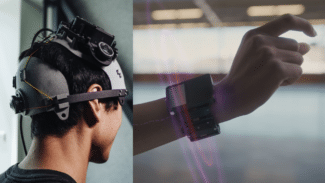Facebook Reality Labs is sunsetting its research toward head-mounted thought reading, instead focusing on a wrist-based device.

First vaguely revealed at F8 2017, the project’s stated goal was to “create a system capable of typing 100 words-per-minute straight from your brain” without requiring implanted electrodes or other physically invasive techniques. Such a device could act as input for AR or VR.
This BCI (Brain Computer Interface) work initially happened in Facebook’s ‘Building 8’ advanced research division, run by former director of DARPA Regina Dugan. When Building 8 was disbanded in late 2018 the project moved to Facebook Reality Labs.
In July 2019 Facebook went into more detail in a technical blog post, explaining the technology as near-infrared light imaging used to sense “shifts in oxygen levels within the brain” caused by neurons consuming oxygen when active- an indirect measure of brain activity. “A decade from now, the ability to type directly from our brains may be accepted as a given,” the 2019 blog post stated. “Not long ago, it sounded like science fiction. Now, it feels within plausible reach.”
In a blog post this week, Facebook says it “reevaluated” its objectives for BCI research. It is no longer working on a head-mounted optical device for reading speech from thoughts. Instead it will focus on the wrist-based device it showed off earlier this year, which it says has “a nearer-term path to market”.
The wrist device uses EMG (electromyography) to sense the neural signals passing through your arm to your hand & fingers, replacing the need for optical hand tracking – and avoiding the limitations of cameras. Facebook claims this high bandwidth input will be “highly reliable, subtle, personalizable, and adaptable to many situations”. FRL Research Director Sean Keller goes so far as to suggest “it will be the core input for AR glasses.”
Facebook says it “still believes in the long-term potential of head-mounted optical BCI technologies”, even though it isn’t working on it. The company is making its BCI software open source and plans to “share head-mounted hardware prototypes with key researchers and other peers to help advance new use cases, such as assistive technologies”.





